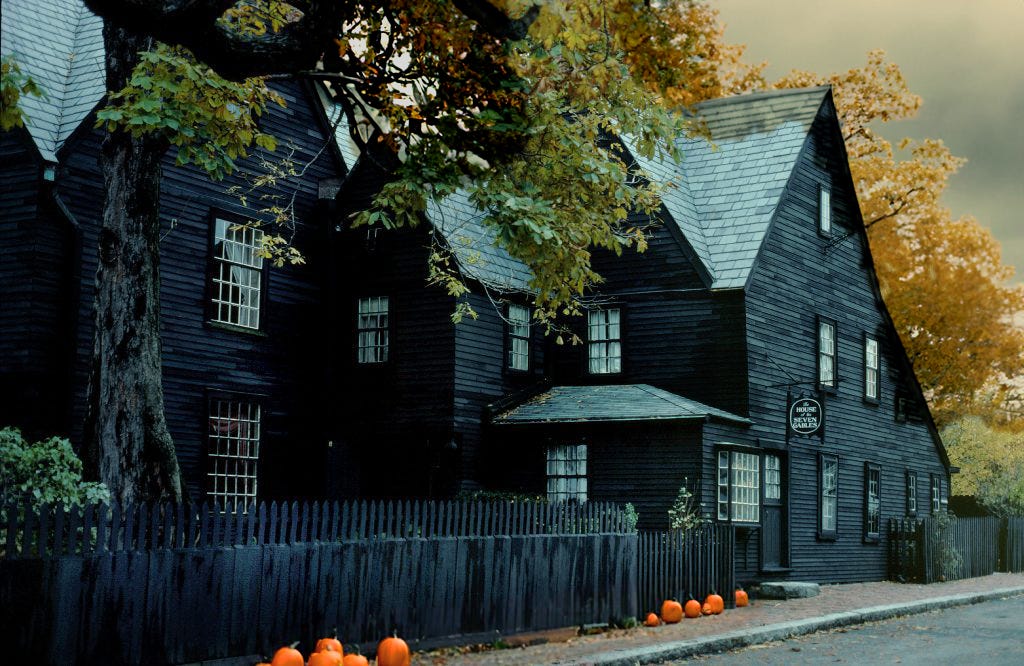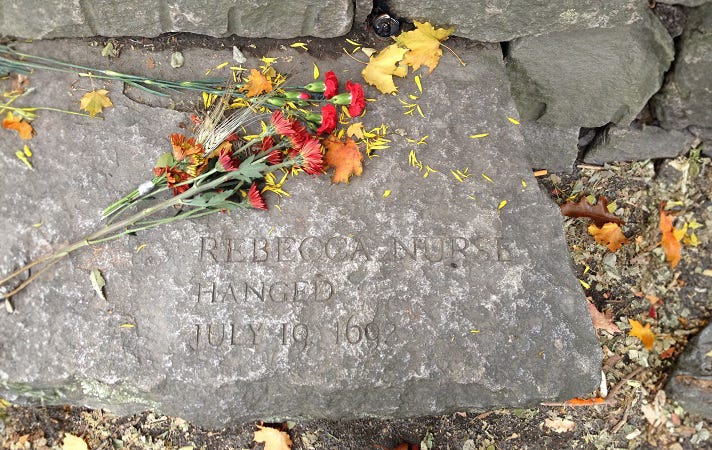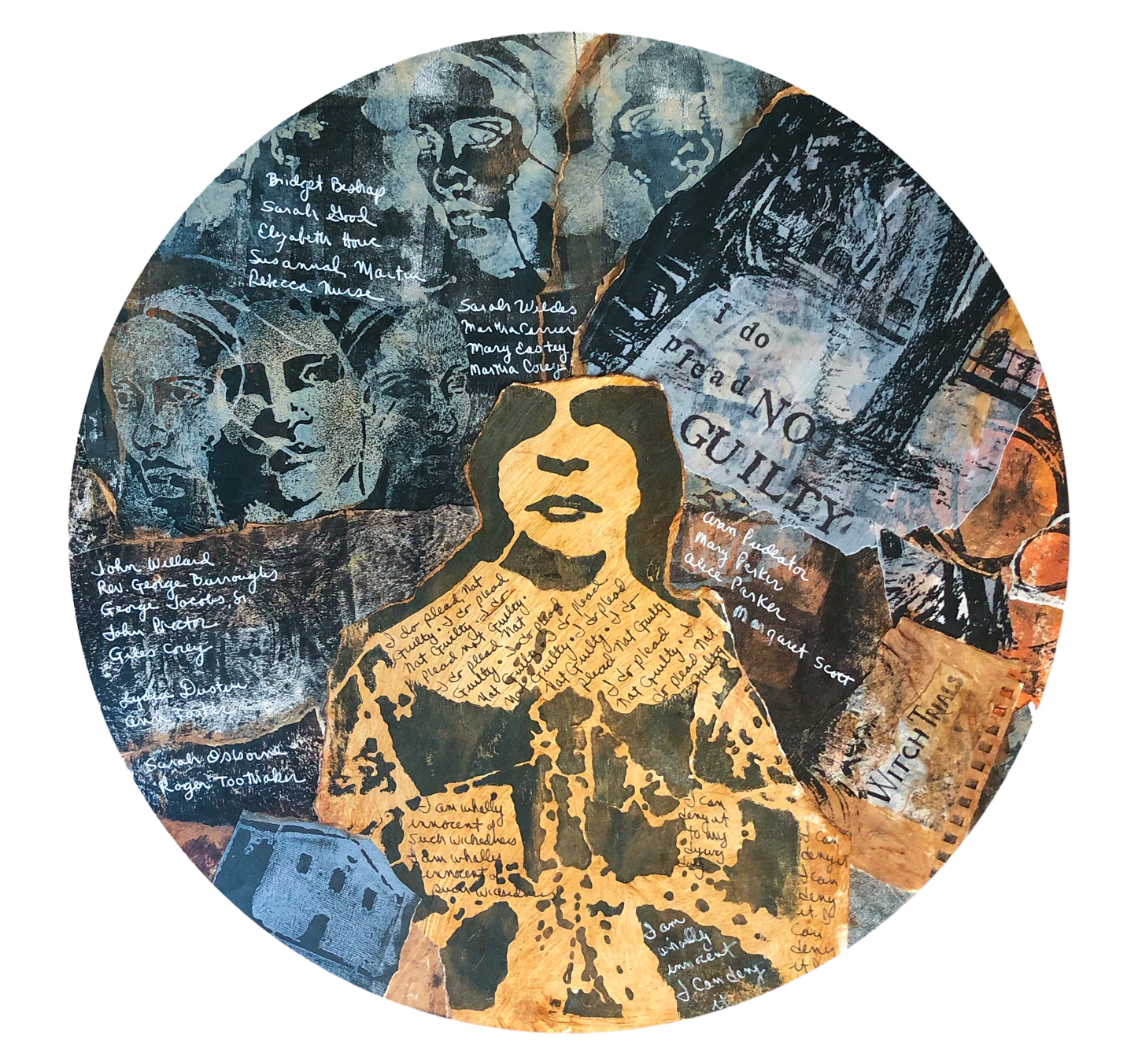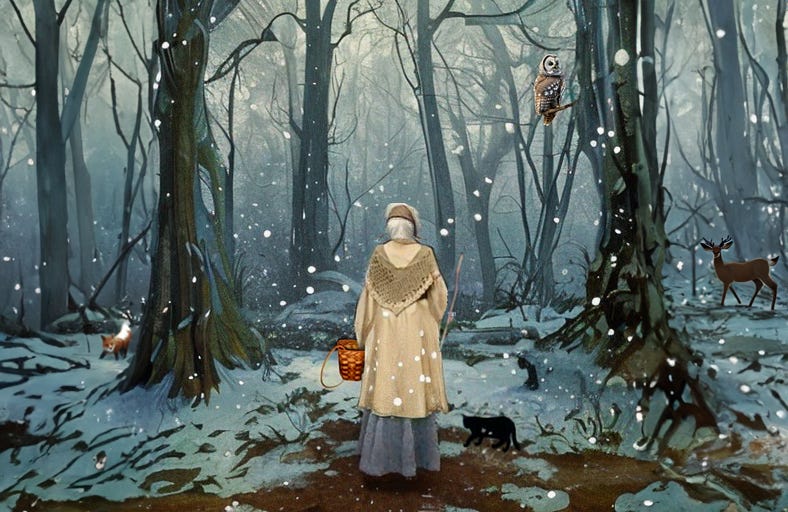1692, a bad year for witches
what I learned from the Salem Witch Trials
If you liked reading this, feel free to click the ❤️ button on this post so more people can discover it on Substack 🙏

A few weeks ago I bought a tee shirt. I usually wouldn't share such a mundane event with you, but this tee shirt has a story. Its story is so controversial that I debated for a long time before purchasing it. Once I did buy it, I immediately wore it to see what kind of reaction I would get.
My husband gave me a quizzical look and asked, "What's the reference?" Later that day at the local agricultural fair, a woman stopped me, smiled, and said, "I like your shirt." So, how controversial was this shirt really? Like my husband, most people didn't get the reference, but as they say, "If you know, you know."
So what does this mysterious, possibly controversial shirt say?
1692 They missed one.

The reference is, of course, to the infamous witch trials in Salem, Massachusetts, in the summer of 1692. In fact, tomorrow, September 22, will mark the anniversary of the last execution carried out during the witch trials three hundred and thirty-one years ago, just on the cusp of the autumn equinox.
Since this shirt didn't stir any controversy when I wore it, it dawned on me that the controversy might be in my head, in my history with and perceptions of what the shirt meant. When these kinds of realizations happen, it's good to explore.
I'm not a practitioner of Wicca. (If you are, hello and welcome.) For those who don't know, Wicca is a relatively new religion founded and developed by Gerald Gardener in England in the 1950s. Its influences include Gardener's time in India and what he observed and experienced there, the writings of Margaret Alice Murray (1863-1963, yes, she lived 100 years), an English-Indian Egyptologist, archaeologist, anthropologist, and folklorist along with the neo-pagan communities already in existence in England in the 1920s and 30s. These movements blossomed out of the 19th-century Romantic movement as an ideological and aesthetic counter to Western modernity and industrialism. The Gardeniarian Tradition is called Wicca. I also recognize there are many others who embrace a non-specific, nature-based, non-monotheistic spiritual practice that may use the term witch to describe themselves.
If you know the date's significance, you would infer that I'm a witch from the phrase on the shirt. That was part of my long process of debating about buying this shirt. I'm not a witch in the Gardeniarian sense of the word. I consider myself a Christian, albeit one more aligned with the mystical and esoteric aspects of the faith, allowing me to enter deep communion with the natural and spirit worlds. My love for Jungian depth psychology, myth, folklore, growing things, herbs, talking to animals, natural medicine, and the like locates me more as a "witch" in the folkloric or archetypal sense. As an older woman who heals with plant medicine, reads the signs of the natural world, loves the earth, tends a garden, brews tea, works with the elements, and engages with the spiritual realms in conventional and unconventional ways, I fit into that kind of ideological and aesthetic counter to modernity. I don't want to claim to be something I'm not and, in the process, disrespect those whose path is Wicca and, in the process, also transgress my own spiritual tradition. That’s what felt so controversial to me. I will pause here and say that whatever spiritual path you have chosen, I hope it leads you to Truth, Beauty, and Goodness.
There is a reason I wanted this shirt and decided I could wear it. Now that we have context, I can guide you on exploring the Salem Witch Trials, what I've learned from them, and why I wanted the shirt.
I have a long history with Salem. For about six years, my daughter lived in towns adjacent to Salem. She worked in Salem at the Peabody Essex Museum, which has an impressive repository of artifacts relating to the witch trials. In fact, they have an exhibition on The Salem Witch Trials: Restoring Justice right now.
I've been to Salem many times and love this fun, funky city with its long, weird history. The irony that Salem has become famous as The Witch City, where all things witchy are celebrated and generates substantial tourist revenue from its witch-themed shops, attractions, tours, and events, does not go unnoticed.
Is it commercial, kitschy, and sometimes cringy? Yes, but there are also deep historical roots and substantial lessons we learn from its past.

I was alone the first time I visited the Salem Witch Trials Memorial. It was August 25, 2012, my very first visit to Salem. Back then, I took a sketchbook with me everywhere I went. As I walked through the memorial to pay my respects to each victim, I became very somber. Then I sat at the entrance looking in and sketched the one wall and path I was facing. At my feet, inscribed in stone, were quotes from the accused taken from historical documents of the trial.
Some of them I recorded in my sketchbook...
I am wholly innocent of such wickedness.
I do plead not guilty.
I can deny it to my dying day.

It was such a powerful moment for me. I felt the accused's confusion, panic, and disbelief about what was happening to them. The injustice lingered in the air. The weight of the shame and guilt that eventually settled on the community hung in the air around me. That shame and guilt didn’t immediately find expression. In the wake of the witch hysteria, many records of the events were burned, and it was forbidden to write about the events of that summer. It wasn’t until over a decade later that the community would receive apologies from some of the accusers and a few of the judges, though not all.
Four generations later Nathaniel Hawthorne, the author of The House of the Seven Gables, seen in the first photo, changed his name to distance himself from his family’s ties to that horrific event.
The novelist’s great-great-grandfather, John Hathorne, was a leading judge of the Salem witch trials, and Hawthorne was haunted by his ancestor’s shameful past. Some believe that shortly after graduating from Bowdoin, the author added a “w” to his last name in part to make the spelling match the pronunciation and also to disassociate himself from a figure of whom he wrote was “so conspicuous in the martyrdom of the witches, that their blood may fairly be said to have left a stain upon him.” ~ History.com
Now we come to why I felt the slogan on my new shirt aligned with who I am. Unlike the many horror movies about the Salem Witch Trials, the accused weren't witches or pagans. They weren't meeting in the woods under the full moon, casting spells, or making a pact with the devil. They weren’t even the cunning women and men often caught up in witch hunts in England in prior decades. All of those accused and executed were Christians. Thirty percent of the formally charged or those brought under suspicion were ministers or members of their families. While not every Salem Town or Salem Village resident was a Puritan, they were at least members of the Church of England.
That's what I found so devastating and heartbreaking. Some were simply poor and elderly. Others lived on the margins of the community. Some had political enemies and rivals. Many were women and men of deep faith betrayed by their own spiritual community, which broke my heart. To read their testimony is to feel the profound bewilderment at what was happening and their resolve and strength as they stood firm in the Truth and their faith.
The Salem Witch Trials have some unique features. Yet, beyond those, they are part of a long history of persecution of women (and men, too), and this type of betrayal ignited by fear can happen in any community, spiritual or not. It is evidence of the collective shadow we all possess individually and as a group.

I live on the edge of my faith group and hold various opinions outside the approved secular mainstream group-think, too. This is because I value individual freedom of thought and a way of thinking that questions everything. History shows us what a dangerous place that is to be. Our current version of a witch hunt includes canceling, doxxing, swatting, and a weaponized justice system. These are only marginally less terrifying than the gallows.
I find the testimonies of those on trial, who refused to confess and then accuse one or two others to secure their freedom, deeply inspiring. They remind me that Truth is, in fact, a higher principle than even one's own life. So, my shirt reminds me that while societies driven or manipulated by fear or power may seek to destroy, distort, or abandon Truth, I would aspire to be one who would uphold it regardless of the consequences. That's a very, very big aspiration. I can only hope I would do as seventy-one-year-old Rebecca Nurse did in 1692 and hold firm to the Truth.
“I can say before my Eternal Father I am innocent and God will clear my innocency…The Lord knows I have not hurt them. I am an innocent person.” ~ Rebecca Nurse
The "they missed one" phrase on my shirt points not to me identifying as a witch but to me as a lover of Truth, someone who would elevate Truth above my own life, and not confess to a lie, then accuse others to save my skin. That's the example the victims of the Salem Witch Trials have given us and the powerful lesson we can learn from them.
Have you been to Salem? Have you been there at Halloween? Are you a free thinker at the margin of your spiritual tradition? Do you identify as a witch in the folkloric or archetypal sense? How important is Truth in today’s world?
The comments section is a safe and welcoming space to share your insights and experiences.
Comments and conversation are always appreciated and enjoyed, so feel free to let your voice be heard. I read them all and try to respond to each one.
Thank you for reading Hedge Mystic and participating in this vibrant and growing community of creative, spiritual humans. You are always welcome here, appreciated, and loved.
If you liked reading this, feel free to click the ❤️ button on this post so more people can discover it on Substack 🙏
Discussion is encouraged. Leave your reactions and insights in the comments.




I do hate the politicism of the phrase ‘witch hunt’, used by people (mostly men) that haven’t a clue as to what they are speaking about. Insulting to the original women and men who were hunted and murdered.
Let me start by saying that this is a very moving piece. Funny that my husband and I were talking about this very subject sometime back after watching a documentary/ travel program on the Witch Trials. I made the comment that had I been living in the time of the witch trials I would have most certainly been accused as well. To my surprise my husband agreed with me! The conversation was about how many healers, midwives and wise women lost their lives under the sanctions of the Church. Europe had their own time of the Witch Trials where accused women were physically searched by men for unusual signs in what can only be described in a sexual way. How mortifying it must have been for these women to be so violated and how horrific it must have been being accused when they had done nothing wrong.
I no longer attend church but I am Christian. I’v become disillusioned by the way people who don’t fit the “Christian Cookie Cutter” have been treated in very unchristian ways by churches. I want no part of that.
I live as close as I can to the rhythms of the Earth and my seasonal changes are based on the Moon not our modern calendar. I believe that each living thing has a spirit and should be treated with respect. I grow and use herbs/plants for cleansing and medicine. I’m still trying to figure out the Goddess aspect as a Christian but the more I learn the more it makes sense. I’m slowly coming to the conclusion that she was displaced by men dictating the early Church. So all this being said, does this make me a Witch? What exactly is a Witch? What specifically defines her or him?